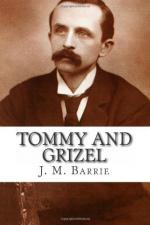One can see exactly how it should be done, it has been done so often before. And there is a deal to be said for this method. His book was what he had been at during nearly the whole of that time; comparatively speaking, the fishing and “other distractions” (a neat phrase) had got an occasional hour only. But while we admire, we can’t do it in that way. We seem fated to go on taking it for granted that you know the “vital facts” about Tommy, and devoting our attention to the things that the real biographer leaves out.
Tommy arrived in London with little more than ten pounds in his pockets. All the rest he had spent on Elspeth.
He looked for furnished chambers in a fashionable quarter, and they were much too expensive. But the young lady who showed them to him asked if it was the Mr. Sandys, and he at once took the rooms. Her mother subsequently said that she understood he wrote books, and would he deposit five pounds?
Such are the ups and downs of the literary calling.
The book, of course, was “Unrequited Love,” and the true story of how it was not given to the world by his first publishers has never been told. They had the chance, but they weighed the manuscript in their hands as if it were butter, and said it was very small.
“If you knew how much time I have spent in making it smaller,” replied Tommy, haughtily.
The madmen asked if he could not add a few chapters, whereupon, with a shudder, he tucked baby under his wing and flew away. That is how Goldie & Goldie got the book.
For one who had left London a glittering star, it was wonderful how little he brightened it by returning. At the club they did not know that he had been away. In society they seemed to have forgotten to expect him back.
He had an eye for them—with a touch of red in it; but he bided his time. It was one of the terrible things about Tommy that he could bide his time. Pym was the only person he called upon. He took Pym out to dinner and conducted him home again. His kindness to Pym, the delicacy with which he pretended not to see that poor old Pym was degraded and done for—they would have been pretty even in a woman, and we treat Tommy unfairly in passing them by with a bow.
Pym had the manuscript to read, and you may be as sure he kept sober that night as that Tommy lay awake. For when literature had to be judged, who could be so grim a critic as this usually lenient toper? He could forgive much, could Pym. You had run away without paying your rent, was it? Well, well, come in and have a drink. Broken your wife’s heart, have you? Poor chap, but you will soon get over it. But if it was a split infinitive, “Go to the devil, sir.”
“Into a cocked hat,” was the verdict of Pym, meaning thereby that thus did Tommy’s second work beat his first. Tommy broke down and wept.
Presently Pym waxed sentimental and confided to Tommy that he, too, had once loved in vain. The sad case of those who love in vain, you remember, is the subject of the book. The saddest of autobiographies, it has been called.




